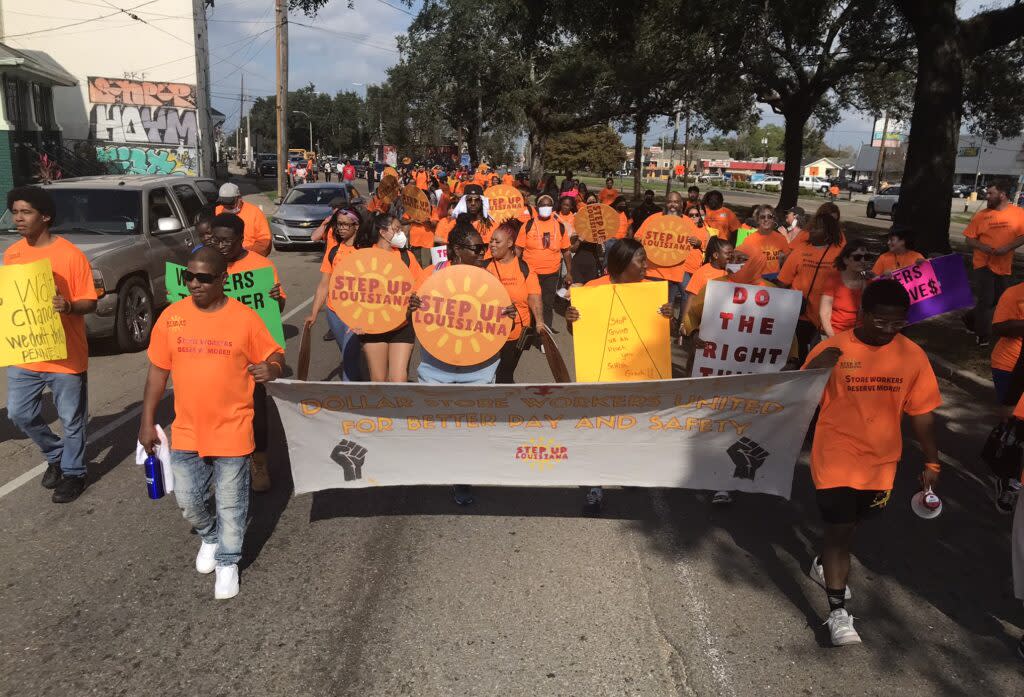Protest organizers could face harsher criminal penalties in Louisiana

- Oops!Something went wrong.Please try again later.
Dollar store employees march in protest n New Orleans, seeking safer working conditions and better pay, Dec. 10, 2022. (Greg LaRose/Louisiana Illuminator)
The Louisiana Legislature is on the verge of enacting harsher criminal penalties on people who organize protests without government permission.
House Bill 127, sponsored by Rep. Mike Bayham, R-Chalmette, sailed Tuesday through the Senate Committee on Judiciary C without objection. The committee’s sole Democratic member, Sen. Regina Barrow of Baton Rouge, was presenting multiple bills of her own before a House committee when the vote occurred.
Bayham’s proposal would expand a state criminal statute that outlaws obstruction of a highway, road, railway, airport runway or navigable waterway. The proposed language would allow law enforcement and prosecutors to apply the law to anyone who organizes or plans a protest or demonstration without a government permit.
Under current law, the crime of blocking a roadway is considered a misdemeanor punishable by a $250 fine, six months in prison or both. It applies to anyone who physically performs an act such as protesting or placing an obstacle on a street that makes it harder for automobiles to pass or obstructing a waterway to block vessels.
Bayham’s bill increases the fine to $750 for the misdemeanor act of obstructing a road. It adds a new provision to specifically go after protest organizers by applying the statute to the “coordination, organization or planning” of a demonstration that blocks or slows down traffic.
“I am all for the First Amendment … but you do not have the right to block a highway out of the blue just because you believe your cause is justified,” Bayham told the committee.
That was about the extent of Tuesday’s debate in the Senate committee, contrasting with the flood of testimony when Bayham presented his bill on the House floor last month. No one who opposes his legislation spoke at Tuesday’s committee hearing.
Some House Democrats, speaking against the bill last month, pointed out that the most effective protests throughout history have occurred organically without much pre-coordination and without the government’s permission.
The bill does not specify what would constitute “coordination, organization or planning.” It’s unclear if it would apply only to someone who explicitly tells protestors to obstruct traffic or if it would also apply if protestors unintentionally slow down traffic with their mere presence near a roadway.
During House floor debate, Rep. Matthew Willard, D-New Orleans, raised a contentious point when he disagreed with Bayham over the meaning of the word “coordination.” Willard argued the bill would criminalize the mere thought of a protest on a roadway.
Bayham said “coordination” means to actively communicate with or direct another person to carry out some action, but the bill doesn’t define the word or explicitly require the involvement of more than one person. Willard said coordination can also be a solo act.
Language in the bill seeks to outlaw something that “could totally occur in somebody’s head,” Willard said at the time, adding that the proposal could violate the First Amendment rights to free thought and assembly.
The measure is now pending on the Senate floor for final consideration before heading to Gov. Jeff Landry, a Republican, for approval.
The post Protest organizers could face harsher criminal penalties in Louisiana appeared first on Louisiana Illuminator.

